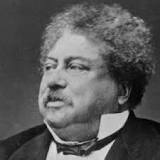The Count of Monte Cristo
The Count of Monte Cristo is an adventure novel by French author Alexandre Dumas completed in 1844. It is one of the author's most popular works, along with The Three Musketeers.
VOLUME ONE Chapter 1. Marseilles—The Arrival On the 24th of February, 1815, the look-out at Notre-Dame de la Garde signalled the three-master, the Pharaon from Smyrna, Trieste, and Naples. As usual, a pilot put off immediately, and rounding the Château d’If, got on board the vessel between Cape Morgiou and Rion island. Immediately, and according to custom, the ramparts of Fort Saint-Jean were covered with spectators; it is always an event at Marseilles for a ship to come into port, especially when this ship, like the Pharaon, has been built, rigged, and laden at the old Phocee docks, and belongs to an owner of the city. The ship drew on and had safely passed the strait, which some volcanic shock has made between the Calasareigne and Jaros islands; had doubled Pomègue, and approached the harbor under topsails, jib, and spanker, but so slowly and sedately that the idlers, with that instinct which is the forerunner of evil, asked one another what misfortune could have happened on board. However, those experienced in navigation saw plainly that if any accident had occurred, it was not to the vessel herself, for she bore down with all the evidence of being skilfully handled, the anchor a-cockbill, the jib-boom guys already eased off, and standing by the side of the pilot, who was steering the Pharaon towards the narrow entrance of the inner port, was a young man, who, with activity and vigilant eye, watched every motion of the ship, and repeated each direction of the pilot. The vague disquietude which prevailed among the spectators had so much affected one of the crowd that he did not await the arrival of the vessel in harbor, but jumping into a small skiff, desired to be pulled alongside the Pharaon, which he reached as she rounded into La Réserve basin. When the young man on board saw this person approach, he left his station by the pilot, and, hat in hand, leaned over the ship’s bulwarks. He was a fine, tall, slim young fellow of eighteen or twenty, with black eyes, and hair as dark as a raven’s wing; and his whole appearance bespoke that calmness and resolution peculiar to men accustomed from their cradle to contend with danger. “Ah, is it you, Dantès?” cried the man in the skiff. “What’s the matter? and why have you such an air of sadness aboard?” “A great misfortune, M. Morrel,” replied the young man, “a great misfortune, for me especially! Off Civita Vecchia we lost our brave Captain Leclere.” “And the cargo?” inquired the owner, eagerly. “Is all safe, M. Morrel; and I think you will be satisfied on that head. But poor Captain Leclere——” “What happened to him?” asked the owner, with an air of considerable resignation. “What happened to the worthy captain?” “He died.” “Fell into the sea?” “No, sir, he died of brain-fever in dreadful agony.” Then turning to the crew, he said, “Bear a hand there, to take in sail!” All hands obeyed, and at once the eight or ten seamen who composed the crew, sprang to their respective stations at the spanker brails and outhaul, topsail sheets and halyards, the jib downhaul, and the topsail clewlines and buntlines. The young sailor gave a look to see that his orders were promptly and accurately obeyed, and then turned again to the owner. “And how did this misfortune occur?” inquired the latter, resuming the interrupted conversation. 0023m “Alas, sir, in the most unexpected manner. After a long talk with the harbor-master, Captain Leclere left Naples greatly disturbed in mind. In twenty-four hours he was attacked by a fever, and died three days afterwards. We performed the usual burial service, and he is at his rest, sewn up in his hammock with a thirty-six-pound shot at his head and his heels, off El Giglio island. We bring to his widow his sword and cross of honor. It was worth while, truly,” added the young man with a melancholy smile, “to make war against the English for ten years, and to die in his bed at last, like everybody else.” “Why, you see, Edmond,” replied the owner, who appeared more comforted at every moment, “we are all mortal, and the old must make way for the young. If not, why, there would be no promotion; and since you assure me that the cargo——” “Is all safe and sound, M. Morrel, take my word for it; and I advise you not to take 25,000 francs for the profits of the voyage.” Then, as they were just passing the Round Tower, the young man shouted: “Stand by there to lower the topsails and jib; brail up the spanker!” The order was executed as promptly as it would have been on board a man- of-war. “Let go—and clue up!” At this last command all the sails were lowered, and the vessel moved almost imperceptibly onwards. “Now, if you will come on board, M. Morrel,” said Dantès, observing the owner’s impatience, “here is your supercargo, M. Danglars, coming out of his cabin, who will furnish you with every particular. As for me, I must look after the anchoring, and dress the ship in mourning.” The owner did not wait for a second invitation. He seized a rope which Dantès flung to him, and with an activity that would have done credit to a sailor, climbed up the side of the ship, while the young man, going to his task, left the conversation to Danglars, who now came towards the owner. He was a man of twenty-five or twenty-six years of age, of unprepossessing countenance, obsequious to his superiors, insolent to his subordinates; and this, in addition to his position as responsible agent on board, which is always obnoxious to the sailors, made him as much disliked by the crew as Edmond Dantès was beloved by them. “Well, M. Morrel,” said Danglars, “you have heard of the misfortune that has befallen us?” “Yes—yes: poor Captain Leclere! He was a brave and an honest man.” “And a first-rate seaman, one who had seen long and honorable service, as became a man charged with the interests of a house so important as that of Morrel & Son,” replied Danglars. “But,” replied the owner, glancing after Dantès, who was watching the anchoring of his vessel, “it seems to me that a sailor needs not be so old as you say, Danglars, to understand his business, for our friend Edmond seems to understand it thoroughly, and not to require instruction from anyone.” “Yes,” said Danglars, darting at Edmond a look gleaming with hate. “Yes, he is young, and youth is invariably self-confident. Scarcely was the captain’s breath out of his body when he assumed the command without consulting anyone, and he caused us to lose a day and a half at the Island of Elba, instead of making for Marseilles direct.” 0025m “As to taking command of the vessel,” replied Morrel, “that was his duty as captain’s mate; as to losing a day and a half off the Island of Elba, he was wrong, unless the vessel needed repairs.” “The vessel was in as good condition as I am, and as, I hope you are, M. Morrel, and this day and a half was lost from pure whim, for the pleasure of going ashore, and nothing else.” “Dantès,” said the shipowner, turning towards the young man, “come this way!”
Translation
Translate and read this book in other languages:
Select another language:
- - Select -
- 简体中文 (Chinese - Simplified)
- 繁體中文 (Chinese - Traditional)
- Español (Spanish)
- Esperanto (Esperanto)
- 日本語 (Japanese)
- Português (Portuguese)
- Deutsch (German)
- العربية (Arabic)
- Français (French)
- Русский (Russian)
- ಕನ್ನಡ (Kannada)
- 한국어 (Korean)
- עברית (Hebrew)
- Gaeilge (Irish)
- Українська (Ukrainian)
- اردو (Urdu)
- Magyar (Hungarian)
- मानक हिन्दी (Hindi)
- Indonesia (Indonesian)
- Italiano (Italian)
- தமிழ் (Tamil)
- Türkçe (Turkish)
- తెలుగు (Telugu)
- ภาษาไทย (Thai)
- Tiếng Việt (Vietnamese)
- Čeština (Czech)
- Polski (Polish)
- Bahasa Indonesia (Indonesian)
- Românește (Romanian)
- Nederlands (Dutch)
- Ελληνικά (Greek)
- Latinum (Latin)
- Svenska (Swedish)
- Dansk (Danish)
- Suomi (Finnish)
- فارسی (Persian)
- ייִדיש (Yiddish)
- հայերեն (Armenian)
- Norsk (Norwegian)
- English (English)
Citation
Use the citation below to add this book to your bibliography:
Style:MLAChicagoAPA
"The Count of Monte Cristo Books." Literature.com. STANDS4 LLC, 2025. Web. 21 Feb. 2025. <https://www.literature.com/book/the_count_of_monte_cristo_34>.








Discuss this The Count of Monte Cristo book with the community:
Report Comment
We're doing our best to make sure our content is useful, accurate and safe.
If by any chance you spot an inappropriate comment while navigating through our website please use this form to let us know, and we'll take care of it shortly.
Attachment
You need to be logged in to favorite.
Log In